
ACTA MICROBIOLOGICA ET IMMUNOLOGICA HUNGARICA
Scope & Guideline
Shaping the future of microbiological inquiry.
Introduction
Aims and Scopes
- Microbial Pathogenesis and Epidemiology:
Research examining the pathogenic mechanisms of bacteria, viruses, and fungi, alongside their epidemiological patterns in various settings, including healthcare and community environments. - Antimicrobial Resistance Studies:
Investigations into the emergence, mechanisms, and transmission of antimicrobial resistance among clinically relevant pathogens, with a focus on both genetic characterization and epidemiological trends. - Clinical Microbiology and Diagnostics:
Research focused on improving diagnostic methods for infectious diseases and understanding the clinical implications of microbial infections, including novel diagnostic tools and treatment approaches. - Microbiome Research:
Studies exploring the role of the microbiome in health and disease, including its interaction with pathogens and its impact on immune responses. - Infection Control and Public Health:
Research aimed at understanding infection control practices, public health implications of infectious diseases, and strategies to mitigate outbreaks.
Trending and Emerging
- Carbapenem Resistance and Superbugs:
Research focusing on carbapenem-resistant Enterobacterales, particularly Klebsiella pneumoniae and Acinetobacter baumannii, has surged. This reflects the urgent need to address rising antibiotic resistance in clinical settings. - Impact of the COVID-19 Pandemic:
The journal has increasingly published studies related to COVID-19, including its clinical impact, viral mutation studies, and the role of microbiota in disease outcomes, showcasing the pandemic's influence on research priorities. - Genomic and Molecular Epidemiology:
There is a growing emphasis on genomic analyses to understand microbial resistance patterns and transmission dynamics, highlighting the integration of advanced molecular techniques in infectious disease research. - Microbiota and Immune Interactions:
Emerging research on the complex interactions between the microbiome and the immune system, particularly concerning cancer and autoimmune diseases, indicates a broadening scope of interest in microbiota's role in health. - Biofilm Formation and Clinical Implications:
Studies investigating biofilm production by pathogens and its implications for treatment and infection control are trending, reflecting the challenges posed by biofilm-associated infections.
Declining or Waning
- Traditional Virology Studies:
There has been a noticeable decrease in publications solely focused on traditional virology, particularly studies that do not integrate modern genomic techniques or epidemiological insights into viral infections. - Non-Pathogenic Microbial Studies:
Research on non-pathogenic or environmental microorganisms has decreased, with a shift towards studies that emphasize clinical relevance and pathogenicity. - Basic Microbiology without Clinical Application:
Papers that focus on basic microbiological research without direct clinical implications are becoming less frequent, as the journal increasingly emphasizes translational research that can impact clinical practice.
Similar Journals
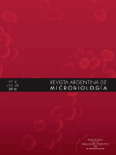
REVISTA ARGENTINA DE MICROBIOLOGIA
Championing the dissemination of vital microbiological discoveries.REVISTA ARGENTINA DE MICROBIOLOGIA, published by the ASOCIACION ARGENTINA MICROBIOLOGIA, stands as a prominent open-access journal in the field of microbiology and medicine since its establishment in 1979. With an ISSN of 0325-7541 and an E-ISSN of 1851-7617, this journal has paved the way for disseminating high-quality research while enhancing accessibility for academics and practitioners worldwide. The journal has achieved notable rankings, being classified in Q3 for Medicine (miscellaneous) and Q3 for Medical Microbiology in 2023, reflecting its commitment to advancing knowledge in these critical areas. Despite its relatively modest impact factors, it occupies a vital niche in the academic landscape, fostering collaborations and innovative research among experts. With Open Access available since 2013, REVISTA ARGENTINA DE MICROBIOLOGIA not only facilitates widespread distribution of valuable scientific information but also empowers researchers, professionals, and students to stay abreast of the latest findings and developments in microbiology. For those engaged in the evolving realm of microbiology, this journal serves as an essential resource for sharing insights and advancing the scientific community.
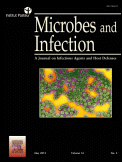
MICROBES AND INFECTION
Elevating Research Standards in Infectious DiseasesMICROBES AND INFECTION is a premier academic journal published by Elsevier, dedicated to the dynamic fields of immunology, infectious diseases, and microbiology. With a notable impact factor reflective of its high-quality research contributions, the journal is categorized in the Q2 quartile across these fields as of 2023. Based in France and operating since 1999, MICROBES AND INFECTION offers a platform for researchers, professionals, and students to disseminate and access cutting-edge findings that drive innovation and knowledge in microbial and infectious disease research. The journal is ranked impressively within the Scopus database, securing ranks such as #16 in Microbiology and #33 in Infectious Diseases, underscoring its high relevance in the scientific community. Subscribers to the journal can expect an array of articles, reviews, and original research, all designed to advance understanding and improve clinical practices in the fight against infectious agents. With its ongoing commitment to open access options, MICROBES AND INFECTION continues to foster global collaboration and information sharing in the pursuit of addressing pressing microbiological challenges.

Annals of Clinical Microbiology and Antimicrobials
Connecting researchers to the latest advancements in infectious diseases.Annals of Clinical Microbiology and Antimicrobials, published by BMC, is a leading open-access journal that has been fostering scientific discourse in the fields of microbiology and infectious diseases since its inception in 2002. With an established reputation for excellence, this journal is positioned in the prestigious Q1 category across multiple disciplines, including Infectious Diseases, Medicine (miscellaneous), and Medical Microbiology as of 2023. This journal serves as a vital platform for researchers, healthcare professionals, and students, promoting the latest advancements in clinical microbiology and antimicrobial research. Access to its invaluable content is open to all, reflecting the commitment to disseminate knowledge universally. The Annals of Clinical Microbiology and Antimicrobials is based in the United Kingdom and continues to pave the way for innovation and discussions that shape the future of clinical practices in microbiology.
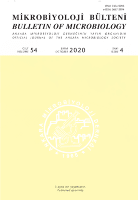
MIKROBIYOLOJI BULTENI
Shaping the Future of Microbial ScienceMIKROBIYOLOJI BULTENI, with ISSN 0374-9096, is a prestigious academic journal published by the ANKARA MICROBIOLOGY SOC, located in Ankara, Turkey. Established in 1973, this journal has been a vital conduit for disseminating research in the fields of Immunology, Microbiology, and Infectious Diseases, garnering a reputation as a significant contributor to the scientific community. The journal is currently ranked in the Q3 category within Immunology and Microbiology (miscellaneous), and Infectious Diseases, indicating its impactful presence amidst contemporary research. With access options that may be restricted, MIKROBIYOLOJI BULTENI actively welcomes submissions that advance the understanding of critical microbiological principles and practices, thereby supporting both national and international research efforts. Researchers, professionals, and students are encouraged to explore the latest findings shared in this journal, as it continually shapes the landscape of microbiology and infectious disease studies through its comprehensive and rigorous peer-reviewed publications.
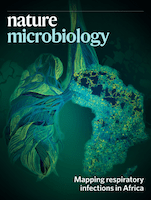
Nature Microbiology
Pioneering Research for a Healthier TomorrowNature Microbiology is a premier journal published by NATURE PORTFOLIO that has firmly established itself within the realms of microbiological research since its inception in 2016. Based in the United Kingdom, this prestigious journal specializes in the intricacies of applied microbiology, cell biology, genetics, immunology, and medical microbiology, making it a cornerstone for academics and professionals alike. With an impressive Scopus ranking placing it in the top tier across various relevant categories—such as rank #3 in Genetics and #2 in Applied Microbiology—it underscores the journal’s commitment to high-quality, impactful research. Although it operates under a subscription model, Nature Microbiology's broad Open Access policy facilitates greater dissemination and visibility for its authors. The journal's objectives are centered around publishing cutting-edge advancements that enhance our understanding of microbial life, its interactions, and applications in health and disease. As a Q1 journal across multiple disciplines, it holds immense significance for researchers, professionals, and students enthusiastic about the latest innovations and breakthroughs in microbiology.

Current Clinical Microbiology Reports
Empowering Research for Infectious Disease SolutionsCurrent Clinical Microbiology Reports, published by Springer, is a leading international journal dedicated to advancing the field of clinical microbiology. With a focus on the diagnosis, treatment, and prevention of infectious diseases, this journal serves as a vital resource for researchers, medical professionals, and students engaged in microbiological studies. As a testament to its quality and influence, it holds an impressive impact factor and ranks in the Q1 category in both Infectious Diseases and Microbiology (medical), reflecting its prominent standing in the scholarly community. Additionally, it features a commendable Scopus ranking, placing it in the 77th percentile for Medicine - Infectious Diseases and the 69th percentile for Medicine - Microbiology (medical). With contributions spanning over a decade, from 2014 to 2024, the journal continues to publish high-quality research articles that shape the future of clinical practices and public health policies. While access options are variable, the journal's commitment to open dialogue and dissemination of knowledge makes it a pivotal platform for those passionate about tackling microbial challenges in healthcare.
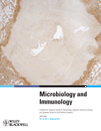
MICROBIOLOGY AND IMMUNOLOGY
Pioneering Discoveries in the World of Microbes and ImmunityMICROBIOLOGY AND IMMUNOLOGY, an esteemed journal published by WILEY, serves as a vital resource for researchers and professionals in the fields of microbiology, immunology, and virology. With its ISSN 0385-5600 and E-ISSN 1348-0421, this journal has been a cornerstone in scientific literature since its inception in 1977, bridging decades of research and innovation through its comprehensive coverage of emerging trends and discoveries. Although this journal operates without open access, it maintains a commendable presence in academic circles, reflected in its 2023 Quartile rankings of Q3 across the categories of Immunology, Microbiology, and Virology. As part of an important discourse in these disciplines, MICROBIOLOGY AND IMMUNOLOGY ensures its scholarly contributions are relevant to both seasoned researchers and emerging scholars. Positioned in a competitive journal landscape, with Scopus ranks indicating a median percentile across its fields, it remains committed to advancing knowledge through peer-reviewed articles, thereby supporting the continuous evolution of its focus areas. The journal's current scope encompasses topics critical for understanding pathogen-host interactions and the immune response, making it a crucial publication for any academic library or individual scholar dedicated to the biological sciences.

INFECTION AND IMMUNITY
Transforming Knowledge into Public Health SolutionsINFECTION AND IMMUNITY is a distinguished peer-reviewed journal published by the American Society for Microbiology, focusing on groundbreaking research in the fields of infection, immunology, microbiology, and parasitology. Established in 1971, this journal has built a robust legacy, converging years of scientific discovery with a vision towards 2024 and beyond. With an impressive Impact Factor, the journal holds significant rankings in various categories; its Q1 status in both Infectious Diseases and Parasitology underscores its high relevance and quality within the scientific community. Researchers and professionals alike will benefit from its content, as it promotes the latest advances in understanding immune responses and infectious agents, further legitimizing its place among the top quartiles of its respective fields. Access options are provided through traditional subscription models, ensuring a broad charitable dissemination of knowledge. As a pivotal resource for scholars and practitioners alike, INFECTION AND IMMUNITY stands at the forefront of microbiological and immunological research, fostering essential discourse that is crucial for advancing public health and scientific insight.
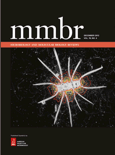
MICROBIOLOGY AND MOLECULAR BIOLOGY REVIEWS
Exploring the Intricacies of Life at the Microbial LevelMICROBIOLOGY AND MOLECULAR BIOLOGY REVIEWS, published by the American Society for Microbiology, is a premier journal dedicated to advancing the fields of microbiology and molecular biology. With an impressive impact factor reflective of its Q1 ranking in categories such as Immunology, Infectious Diseases, and Molecular Biology, this journal consistently showcases high-quality, peer-reviewed articles that contribute to the current understanding of microbial life and molecular mechanisms. Operating since 1997, the journal aims to bridge the gap between microbiological methods and molecular biology applications, making it an essential resource for researchers, professionals, and students alike. Readers can access content through various platforms, ensuring that the latest findings are readily available to the scientific community. With its esteemed reputation, MICROBIOLOGY AND MOLECULAR BIOLOGY REVIEWS remains a leading voice in the exploration of the life sciences, catering to a broad audience deeply invested in unraveling the complexities of microbial and molecular systems.

EPIDEMIOLOGIE MIKROBIOLOGIE IMUNOLOGIE
Advancing Knowledge in Health SciencesEPIDEMIOLOGIE MIKROBIOLOGIE IMUNOLOGIE is a prominent scholarly journal published by CESKA LEKARSKA SPOLECNOST J EV PURKYNE in the Czech Republic. With an ISSN of 1210-7913, this journal has been at the forefront of research since its inception in 1994, showcasing a rich repository of studies bridging the domains of epidemiology, microbiology, immunology, and infectious diseases, and reflecting advancements over three decades. Although it currently falls within the Q4 category in multiple fields including Epidemiology and Microbiology, the journal serves an essential role in disseminating knowledge and fostering discussions around public health challenges. The contributions made through its pages are vital for researchers, healthcare professionals, and students aiming to enhance their understanding of complex biomedical issues. While it does not offer open access, the journal remains a critical resource in its niches, inviting readers to engage with the latest findings and methodologies reshaping the landscape of health science.